From assistance to vegetable growing. This is a step Arie Boers and Adrian Goedegebure took six years ago on Bonaire, the smallest of the three ABC islands as well as a special municipality within the Kingdom of the Netherlands. "With Fundashon Krusada, a foundation that helps individuals and families overcome social problems, we offered small-scale vegetable cultivation as a form of therapy and we actually noticed then that there was a huge demand on the island for local fresh fruit and vegetables."
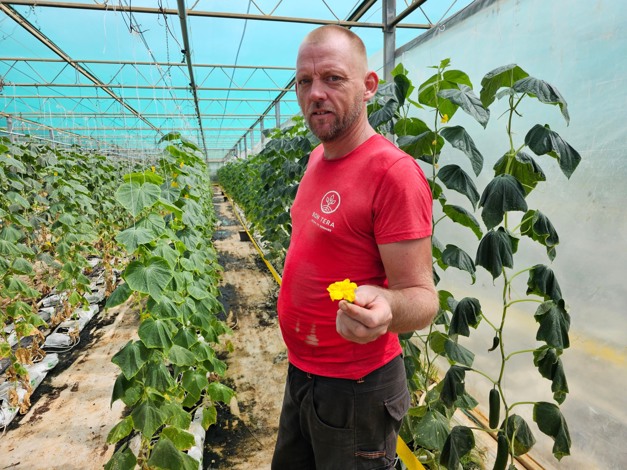
Adrian shows cucumber flowers they sell to the catering industry
Arie, who was familiar with cultivation in the Netherlands, and Adrian teamed up to create a Dutch-made open greenhouse with only shade cloth and, by trial and error, rolled into the tropical horticulture business. Each year, the area under cultivation expanded a little, the range widened a little and the customer base widened a little.
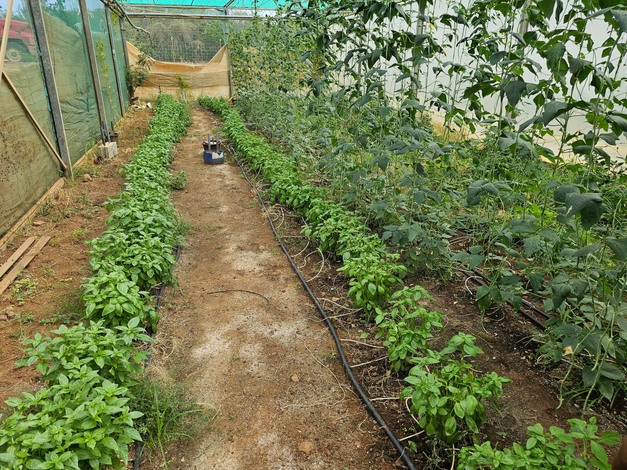
Bontera grows basil and mint, among others
It started with baby leaf, cresses and spinach - a special variety, namely Malabar spinach, whose plant crawls upwards and can grow two meters - but in the meantime, in the greenhouse of what was named Bon Tera Bonaire, you will also find watermelons, (snack) cucumbers, the typical Surinamese vegetable long beans, cherry tomatoes - this product only in the cooler months, just after the rainy season - and herbs such as basil and mint. The cress offering includes red and green radish, sunflower, and pea.
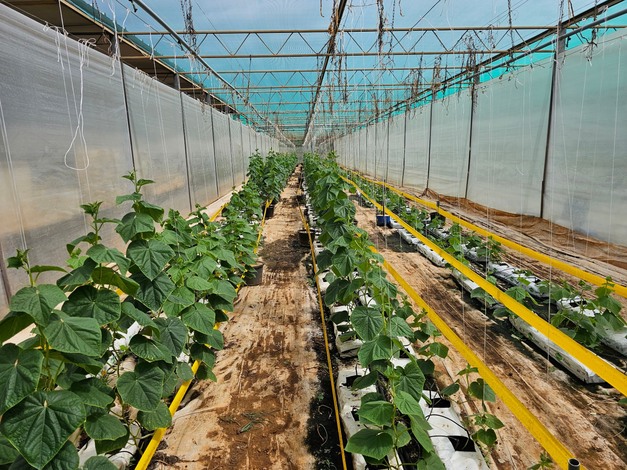
Newly planted cucumbers
"Not everything grows here"
"I think we still have a nice mix of produce in the greenhouse. Realize that not everything grows here. It is always warm and between day and night, the temperature difference is barely 3 degrees. In that sense, it also comes down to selecting the right varieties. So we tried and tested several cucumber varieties for heat resistance and average yield, among other things, to arrive at the final choice."
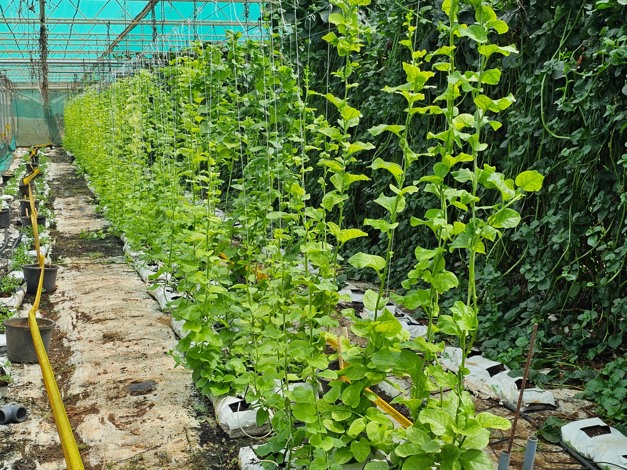
Newly planted picking spinach.
The consistently high temperature of around 33 degrees is the biggest challenge in cultivation. "The irrigation water also heats up considerably during the day so we prefer to water the plants early in the morning and late in the evening. We also irrigate during the day, but then the water temperature has to be taken into account continuously," Adrian says. "In the middle of the day, the leaves of the cucumber go completely limp, then they recover in the evening. We don't cool water and we don't have fans hanging in the greenhouse, because then you have the cost of electricity. The wind blowing through the greenhouse provides the necessary cooling."
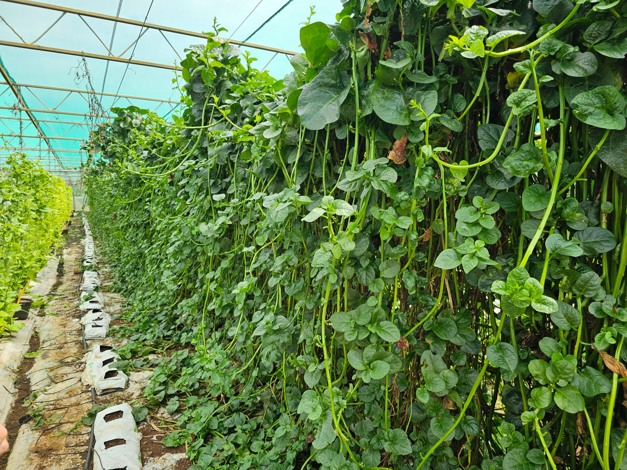
Mature spinach plants are picked several times a week
Prefer rainwater to well or tap water
Bon Tera operates off-grid in terms of energy. Electricity comes from solar panels. "A water connection is there and tap water also forms the basis of irrigation, but in the rainy season, we prefer the more nutritious water from the rain that we collect. There is too much salt in the well water and tap water is and remains expensive, although it is slightly cheaper than on Curaçao. Should stimulating horticulture on the island become a government priority, subsidizing irrigation water could be one of the first policy points."
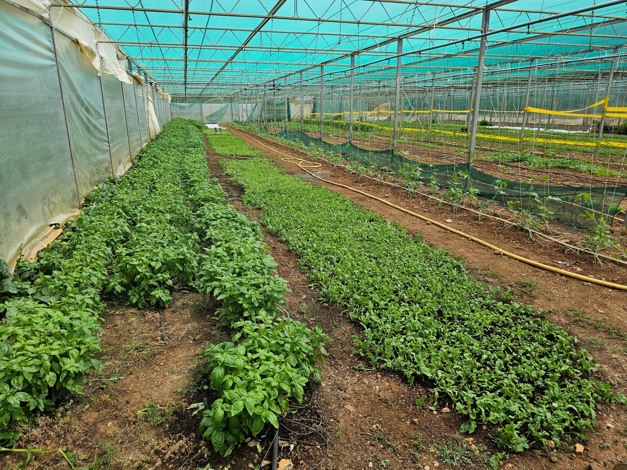
Basil and babyleaf for Bonaire's hospitality industry
"It is remarkable that there are loud cries that more horticulture is needed on Bonaire, but laws and regulations are not geared towards it. Also, existing initiatives are not supported by knowledge and innovation from the Netherlands, although we could make huge strides with that. Pioneering in tropical horticulture on Bonaire means very often having to invent the wheel yourself. That's a big difference from growing in the Netherlands," says Adrian.
In the 4,500m2 open greenhouse, where the plants are protected from the bright sun only with a shade net, the pest pressure is firm, but still just manageable. "We suffer most from whitefly and spider mites," Arie explains. "With Bonaire's consistently warm temperatures, they find ideal living conditions here. Their growth cycle is quite short. We use glue ribbons to catch the white fly, which mainly attacks cucumber crops. Frogs in the greenhouse also like whiteflies. And if we see it really getting out of hand, we clear the greenhouse. Or part of the greenhouse, because it is divided into several separate compartments so that if there is an outbreak of an infestation, the whole greenhouse does not become infected."
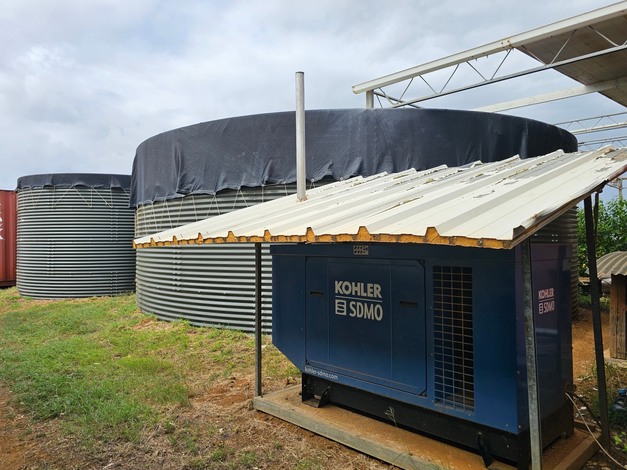 All rainwater is collected. A generator is used mainly in the rainy period because there is not enough light to generate power then
All rainwater is collected. A generator is used mainly in the rainy period because there is not enough light to generate power then
Outdated legislation
Growing in a greenhouse is a requirement on Bonaire, Arie explains. "Full-ground cultivation has little future here because of game damage. Iguanas and lizards feast on every tasty plant. You do see some maize, but that is rather low-value cultivation, you can't make a living from that. In this sense, the legislation stating that only 20% of Kunuku land - land donated to residents in the past and used for agricultural purposes - can contain infrastructure is outdated in my opinion. A greenhouse is an infrastructure, but you cannot grow vegetables or fruit without one."
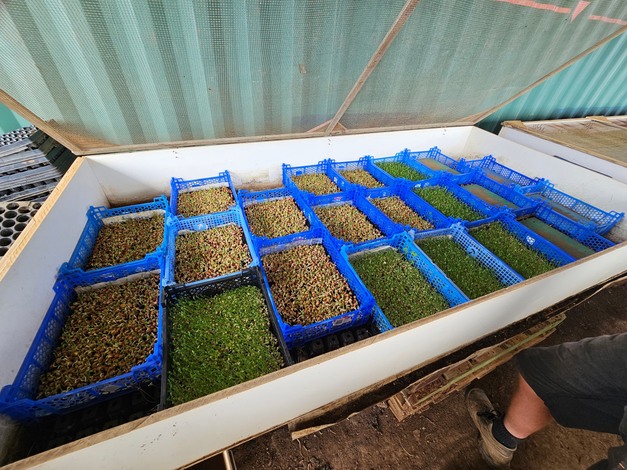 Growing sprouts
Growing sprouts
In terms of quality, according to Adrian, Bon Tera Bonaire's product outperforms the flown-in product - "with us, everything is day fresh: what is ordered in the morning is delivered first thing in the afternoon" - and in terms of price, too, the fruit and vegetables Bon Tera supplies to supermarkets and restaurants are no more expensive. "Labor is our biggest cost item and although we are constantly looking at how we can work more efficiently, we don't see much room for automation," Arie adds. "Perhaps to grow as a company we should still consider growing fewer different products and specialize. Incidentally, the aim is to have each product available for as long as possible, preferably year-round, to ensure continuity of supply for customers."
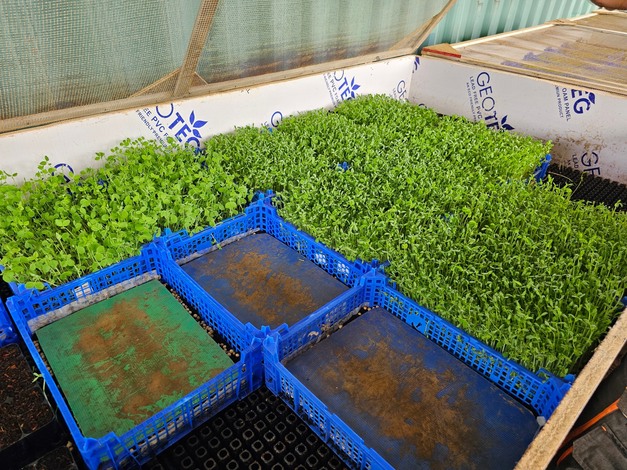 Growing micro-vegetables
Growing micro-vegetables
For more information:
Arie Boers
Adrian Goedegebure
Bon Tera Bonaire
Tel. Arie: +599 700 3497
Tel. Adrian: +599 782 3532
Facebook page
